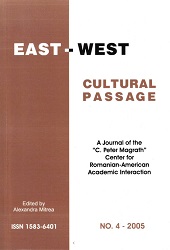When the East Meets the West: Ang Lee’s Cross-Cultural American Family in Taking Woodstock
When the East Meets the West: Ang Lee’s Cross-Cultural American Family in Taking Woodstock
Author(s): TING-TING CHANSubject(s): Politics / Political Sciences, History, Social Sciences, Fine Arts / Performing Arts, Film / Cinema / Cinematography
Published by: Editura Universitatii LUCIAN BLAGA din Sibiu
Keywords: Ang Lee; family; filial piety; Confucian values; film related to the Vietnam War; cross-cultural; Taiwan; Taking Woodstock; transnational; individualism
Summary/Abstract: This article focuses on Taiwanese filmmaker Ang Lee’s Taking Woodstock, a film that directly addresses political and social aspects of a rather turbulent time in the US during the 1960s. I argue that the director’s view of 1960s America in this cinematic representation reflects a particularly Taiwanese cultural ideology—the worship of the US as a superpower. Lee, as an example of transnationality himself, fittingly illustrates how intricately sociohistorical contexts and political diplomatic relations shape an individual’s multifaceted cultural identity, political views, and national ideology in an era when Western thought and lifestyle have found a way to merge themselves with local Taiwanese ones. Taking Woodstock represents Lee’s idealized view of the American society, a utopia that he longed for as a Taiwanese teenager. By focusing on family (one of Lee’s signature themes), Taking Woodstock shows a different view of America from an East Asian perspective. Lee’s Woodstock represents a Taiwanese ideology impacted by US-Taiwanese diplomatic relations, cross-pacific media transmission, state intervention, and pseudo-imperialist cultural invasion in Taiwan.
Journal: East-West Cultural Passage
- Issue Year: 17/2017
- Issue No: 1
- Page Range: 30-49
- Page Count: 20
- Language: English
- Content File-PDF

